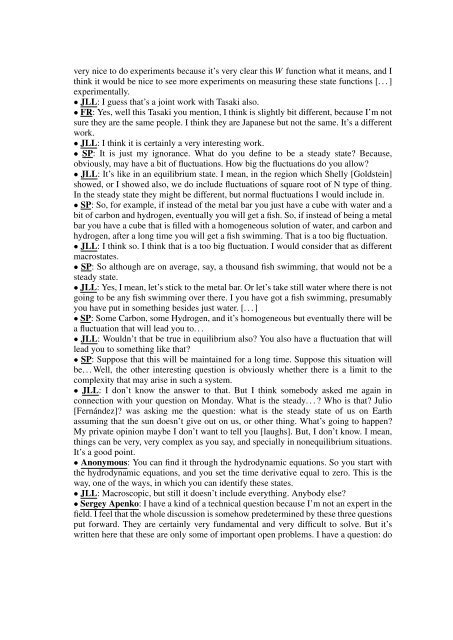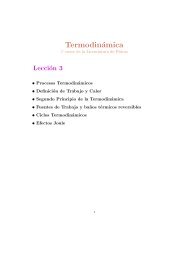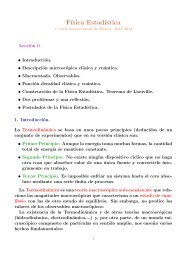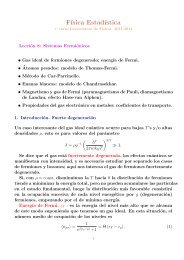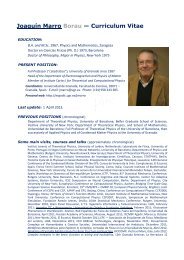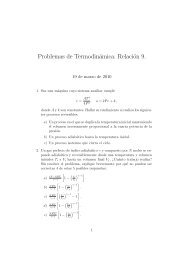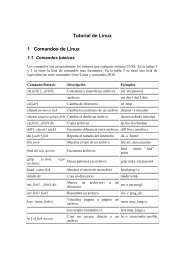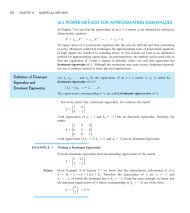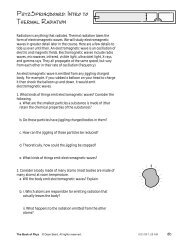23966k - Instituto Carlos I - Universidad de Granada
23966k - Instituto Carlos I - Universidad de Granada
23966k - Instituto Carlos I - Universidad de Granada
Create successful ePaper yourself
Turn your PDF publications into a flip-book with our unique Google optimized e-Paper software.
very nice to do experiments because it’s very clear this W function what it means, and I<br />
think it would be nice to see more experiments on measuring these state functions [. . . ]<br />
experimentally.<br />
• JLL: I guess that’s a joint work with Tasaki also.<br />
• FR: Yes, well this Tasaki you mention, I think is slightly bit different, because I’m not<br />
sure they are the same people. I think they are Japanese but not the same. It’s a different<br />
work.<br />
• JLL: I think it is certainly a very interesting work.<br />
• SP: It is just my ignorance. What do you <strong>de</strong>fine to be a steady state? Because,<br />
obviously, may have a bit of fluctuations. How big the fluctuations do you allow?<br />
• JLL: It’s like in an equilibrium state. I mean, in the region which Shelly [Goldstein]<br />
showed, or I showed also, we do inclu<strong>de</strong> fluctuations of square root of N type of thing.<br />
In the steady state they might be different, but normal fluctuations I would inclu<strong>de</strong> in.<br />
• SP: So, for example, if instead of the metal bar you just have a cube with water and a<br />
bit of carbon and hydrogen, eventually you will get a fish. So, if instead of being a metal<br />
bar you have a cube that is filled with a homogeneous solution of water, and carbon and<br />
hydrogen, after a long time you will get a fish swimming. That is a too big fluctuation.<br />
• JLL: I think so. I think that is a too big fluctuation. I would consi<strong>de</strong>r that as different<br />
macrostates.<br />
• SP: So although are on average, say, a thousand fish swimming, that would not be a<br />
steady state.<br />
• JLL: Yes, I mean, let’s stick to the metal bar. Or let’s take still water where there is not<br />
going to be any fish swimming over there. I you have got a fish swimming, presumably<br />
you have put in something besi<strong>de</strong>s just water. [. . . ]<br />
• SP: Some Carbon, some Hydrogen, and it’s homogeneous but eventually there will be<br />
a fluctuation that will lead you to. . .<br />
• JLL: Wouldn’t that be true in equilibrium also? You also have a fluctuation that will<br />
lead you to something like that?<br />
• SP: Suppose that this will be maintained for a long time. Suppose this situation will<br />
be. . . Well, the other interesting question is obviously whether there is a limit to the<br />
complexity that may arise in such a system.<br />
• JLL: I don’t know the answer to that. But I think somebody asked me again in<br />
connection with your question on Monday. What is the steady. . . ? Who is that? Julio<br />
[Fernán<strong>de</strong>z]? was asking me the question: what is the steady state of us on Earth<br />
assuming that the sun doesn’t give out on us, or other thing. What’s going to happen?<br />
My private opinion maybe I don’t want to tell you [laughs]. But, I don’t know. I mean,<br />
things can be very, very complex as you say, and specially in nonequilibrium situations.<br />
It’s a good point.<br />
• Anonymous: You can find it through the hydrodynamic equations. So you start with<br />
the hydrodynamic equations, and you set the time <strong>de</strong>rivative equal to zero. This is the<br />
way, one of the ways, in which you can i<strong>de</strong>ntify these states.<br />
• JLL: Macroscopic, but still it doesn’t inclu<strong>de</strong> everything. Anybody else?<br />
• Sergey Apenko: I have a kind of a technical question because I’m not an expert in the<br />
field. I feel that the whole discussion is somehow pre<strong>de</strong>termined by these three questions<br />
put forward. They are certainly very fundamental and very difficult to solve. But it’s<br />
written here that these are only some of important open problems. I have a question: do


